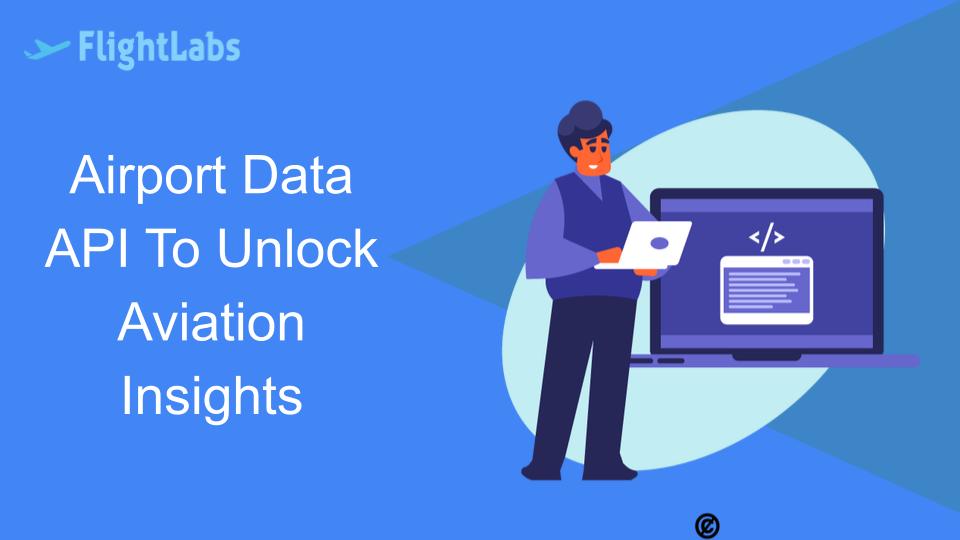Airport Data API To Unlock Aviation Insights

In the dynamic and data-rich aviation industry, unlocking valuable insights is crucial for airlines, airports, travel agencies, and aviation professionals. Airport Data APIs serve as powerful tools that enable users to access comprehensive aviation data and extract actionable insights. In this blog post, we'll delve into how Airport Data APIs unlock aviation insights and empower users to make informed decisions, optimize operations, and enhance the overall aviation experience.
Operational Efficiency Optimization:
Airport Data enables users to optimize operational efficiency by providing real-time updates on flight schedules, statuses, and operational metrics. Airlines and airports can analyze flight trends, on-time performance, passenger flows, resource utilization, and more to identify areas for improvement and implement strategic initiatives. This data-driven approach enhances operational efficiency, reduces costs, and improves overall service quality.
Demand Forecasting and Capacity Planning:
With access to historical and real-time flight data, users can leverage FlightLabs for demand forecasting and capacity planning. Airlines can analyze booking patterns, route performance, seasonal trends, and market demand to adjust flight schedules, allocate resources effectively, and optimize seat capacity. This proactive approach helps airlines meet passenger demand, maximize revenue, and optimize fleet utilization.

Get Started With FlightLabs And Its Benefits
One of the primary benefits of using an FlightLabs is gaining access to a wealth of comprehensive aviation data. This includes information about airport facilities, flight schedules, aircraft details, weather conditions, air traffic, passenger demographics, and more. By accessing such a broad range of data through a single API, users can gain a holistic view of the aviation landscape and uncover valuable insights.
Route Optimization and Performance Analysis:
FlightLabs provides valuable insights for route optimization and performance analysis. Airlines can analyze route profitability, fuel consumption, flight durations, and aircraft utilization to optimize route networks, reduce operational costs, and improve overall flight performance. By identifying high-demand routes, optimizing flight schedules, and monitoring route performance metrics, airlines can enhance competitiveness and profitability.
Customer Experience Enhancement:
Access to aviation data through FlightLabs allows users to enhance the customer experience significantly. Airlines and airports can analyze passenger preferences, behaviors, feedback, and satisfaction levels to personalize services, improve amenities, streamline processes, and deliver a seamless travel experience. Understanding customer needs and expectations enables users to create tailored offerings and build customer loyalty.
Risk Management and Contingency Planning:
FlightLabs play a crucial role in risk management and contingency planning for aviation stakeholders. Users can monitor real-time data on weather conditions, air traffic, flight statuses, and operational disruptions to proactively identify potential risks and implement contingency plans. This proactive approach minimizes disruptions, reduces flight delays, mitigates risks, and enhances overall operational resilience.

Competitive Intelligence and Market Analysis:
FlightLabs provides users with competitive intelligence and market analysis capabilities. Airlines, airports, and travel agencies can analyze market trends, competitor strategies, pricing dynamics, and customer preferences to stay ahead of the competition. By understanding market forces and consumer behavior, users can make informed decisions, differentiate their offerings, and seize new business opportunities.
Innovation and Strategic Decision-Making:
Lastly, FlightLabs fuel innovation and enable strategic decision-making in the aviation industry. Users can leverage data analytics, machine learning algorithms, predictive modeling, and artificial intelligence to derive actionable insights, identify trends, forecast demand, and innovate services. This data-driven approach empowers users to make strategic decisions, drive innovation, and stay agile in a rapidly evolving aviation landscape.
Conclusion:
In conclusion, FlightLabs is powerful tools that unlock valuable aviation insights, enabling users to optimize operations, enhance the customer experience, manage risks, analyze markets, drive innovation, and make informed decisions. By leveraging comprehensive aviation data through APIs, stakeholders in the aviation industry can gain a competitive edge, improve efficiency, and deliver exceptional value to passengers and customers.